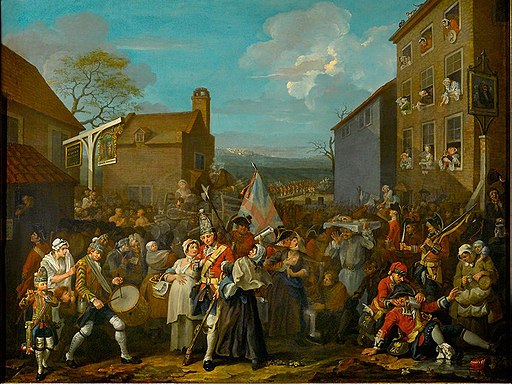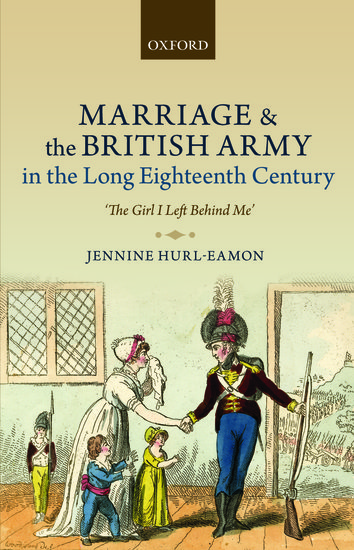By Jennine Hurl-Eamon
Britain’s soldiers were singing about “hot stuff” more than 200 years before Donna Summer released her hit song of the same name in 1979. The true origins of martial ballads are often difficult to ascertain, but a song entitled “Hot Stuff” can be found in print by 1774. The 5 May edition of Rivington’s New York Gazetteer attributes the lyrics to sergeant Edward Bothwood of the 47th Regiment during the Seven Years War (1756-1763).
This text leaves little doubt that “hot stuff” held similar sexual connotations to its eighteenth-century crooners that it does today. Alluding to the famous generals on the battlefields of Quebec, the final verse describes the soldiers invading a French convent (or possibly a bawdy house, since the terms were synonymous among soldiers). The sexual element in “hot stuff” is abundantly clear:
With Monkton and Townshend, those brave Brigadiers,
I think we shall soon knock the town ‘bout their ears;
And when we have done with the mortars and guns,
If you please, madam Abbess, — a word with your Nuns:
Each soldier shall enter the Convent in buff,
And then, never fear, we will give them Hot Stuff.
The Oxford English Dictionary has not previously recognized the use of “hot stuff” as a term to denote sexual attractiveness in the mid eighteenth century; the earliest such usage claimed by the current edition only dates back to 1884 and I have alerted the editors of this earlier example.

Folklore anthologist Roy Palmer uncovered a reference to a pensioner’s wife who swore compulsively, yet was considered a good soul whose coarse language was simply an indelible imprint of army life. One of the most famous of these military wives, Christian Davies — who followed her husband disguised as a soldier and later traveled with the troops as a sutler — commented on an officers’ ability to “curse,” noting one particular lieutenant who “swore a round hand.”
Martial language went beyond swearing, however. Francis Grose proudly named “soldiers on the long march” as one of the “most classical authorities” in the preface of his Classical Dictionary of the Vulgar Tongue (first published in 1785). Having served in the army himself, Grose had first-hand knowledge of military slang. His dictionary referred to terms such as “hug brown bess” meaning “to carry a firelock, or serve as a private soldier;” “fogey” for “an invalid soldier;” and “Roman” for “a soldier in the foot guards, who gives up his pay to his captain for leave to work.”
Though Grose arguably provides the best evidence of military slang in the eighteenth century, other records offer hints. One soldier testified at the Old Bailey in 1756 that it was common for military men to use the term “uncle” to mean “pawnbroker,” for example. The contemporary resonance of terms like “hot stuff” and “fogey” are evidence that some, though not all, eighteenth-century soldiers’ patter eventually found its way into the civilian lexicon.

Tim Cook’s exploration of the colourful idioms of the Canadian troops in the First World War suggests that they served simultaneously to distinguish the Canadians from the other British forces and to help a disparate body of recruits develop a unified identity that separated them from their civilian counterparts. Although many of his insights could be applied to other armies in other wars, Cook limits his observations of language to its role in helping soldiers “endure and make sense of the Great War.”
I would suggest, instead, that linguistic liberties are a common characteristic to all Anglo armies from the eighteenth century onward. More needs to be done to determine whether the phenomenon is broader in geographic and temporal scope, and to understand precisely why military culture tends to take this particular shape.
At the very least, the British soldiers singing bawdily about “hot stuff” in the mid-eighteenth century probably found their shared slang helped to bond them to one another. Language operated similar to the uniform in separating military men from civilians and transforming them into objects of fascination (both positive and negative). Set beside Donna Summer, these raucous soldiers take their proper place at the forefront of popular culture.
Jennine Hurl-Eamon is associate professor of History at Trent University, Canada. She has published several articles and book chapters on aspects of plebeian marriage and the interactions between the poorer classes and the lower courts. She is the author of three books, Gender and Petty Violence in London, 1680-1720 (2005), and Women’s Roles in Eighteenth-Century Europe (2010) and Marriage and the British Army in the Long Eighteenth Century (OUP, 2014).
Subscribe to the OUPblog via email or RSS.
Subscribe to only language articles on the OUPblog via email or RSS.
Image credit: William Hogarth, The March of the Guards to Finchley. (1749-1750); Oil on canvas. Public domain via Wikimedia Commons. (2) Francis Grose By D. O. Hill (Prof Wilson. Land of Burns. 1840). Public domain via Wikimedia Commons




Fascinating stuff.
I love the idea that slang worked to identify/separate soldiers in a similar way to uniforms.
[…] Writing at the Oxford University Press blog, history professor Jennine Hurl-Eamon discusses the deep roots of military culture and how it is expressed in language: […]